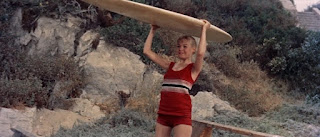Gidget, released in 1959, was the first surfer girl movie and was so successful that it spawned several sequels and a TV series. It paved the way for the beach party movies of the early 60s and it established the existence of a major market for lighthearted teen romance comedies. It launched Sandra Dee’s career. It’s a fun movie and it was interesting in other ways as well, which we’ll get to later.
Francine (Sandra Dee) is a 16-year-old girl about to spend the summer soaking up the sun on the beach. Her friends have other things in mind apart from sun worship. As far as they’re concerned they’re on a hunt for men and they intend to bag a few trophies.
Francine is bitten by the surfing bug. She sees the guys having so much fun and she wants to join. Surprisingly the surfer guys who hang around with Kahuna (Cliff Robertson) are not overly hostile. They agree to teach her to surf. Because she’s a girl and she’s very petite they christen her Gidget (short for girl midget). The fact that Gidget is as cute as a button may have something to do with the fondness the guys feel for her but they’re rather protective of her as well.
Most of the guys just spend the summer surfing but Kahuna is a full-time surfer bum. Moondoggie (James Darren) wants to be a surfer bum as well. Kahuna might be perpetually broke but he’s free. This movie marks a very early appearance of the drop-out in Hollywood movies.
Gidget falls for Moondoggie. He’s not very interested.
Gidget of course has a plan to land her man. Naturally everything goes wrong. Gidget finds herself in a very awkward situation.
There’s plenty of amusement to be had here. There’s some very obvious rear projection which adds to the charm of the movie.
Hollywood teen movies are often mocked for featuring teenagers played by actors who were pushing 30. For Gidget Columbia decided on a radical approach. If they were making a movie about a 16-year-old girl why not get an actress who could do it convincingly? Why not cast an actual 16-year-old girl? Which is what they did. And it works. As a bonus Sandra Dee turned out to be a talented comic actress with immense amounts of charm.
Gidget was made at an incredibly interesting time in Hollywood history, the period around 1958 to1962. The Production code was staring to crumble and Hollywood was tentatively exploring the idea of making movies that dealt with sex in an open and grown-up way. Cat on a Hot Tin Roof, Suddenly Last Summer, Butterfield 8 and The World of Suzie Wong all came out during this brief period. There are very slight hints of this in Gidget. There is at least an acknowledgement of the sexual nature of the interest that Gidget’s female friends have in boys.
Of course there’s also a message that girls are allowed to have sexual feelings as long as they don’t do anything abut it. The Sexual Revolution was on the way but it wasn’t there yet.
There’s also a message about growing up. Growing up means giving up your dreams and giving up silly ideas about freedom. Who needs those things? I’m afraid that the happy ending to this movie left me incredibly depressed.
The acting is pretty good. Cliff Robertson is fun as Kahuna, a man who isn’t as sure of himself as he thought he was. There are early appearances by people who would go on to achieve at least a measure of stardom. There’s Doug McClure, Yvonne Craig and Tom Laughlin. And of course James Darren who later starred in one of my favourite 60s TV series, The Time Tunnel. In Gidget he even sings. He makes a fine leading man for Sandra Dee.
The movie’s biggest strength is Sandra Dee. She’s delightful and she’s very funny. It’s a great pity that this was to be her only appearance as Gidget. She has great chemistry wth James Darren.
Apart from my reservations about the ending Gidget is lightweight amusing romantic fun. Sandra Dee’s performance is enough to warrant a highly recommended rating.
Via Vision in Australia have released the three Gidget movies plus the 1972 TV-movie Gidget Gets Married in both DVD and Blu-Ray boxed sets (both very reasonably priced). Gidget gets an excellent anamorphic transfer, with no extras.





There really was a Big Kahuna. The authors daughter would tell him stories about her friends at the beach those were the basis of the book per an essay in City Journal by Roger McGrath. The big kahuna eventually married his high school cheerleader girlfriend had a family and a couple of car dealerships.
ReplyDelete